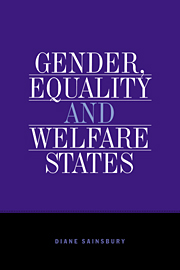Book contents
- Frontmatter
- Contents
- List of figures
- List of tables
- Acknowledgments
- Introduction
- Part I Dimensions of variation
- Part II Bases of entitlement
- 3 The male breadwinner model and women's entitlements as wives
- 4 Women's entitlements as mothers and caregivers
- 5 Women's employment and entitlements as workers
- Part III Stratification and redistributive outcomes
- Part IV Welfare state restructuring
- Notes
- References
- Index
4 - Women's entitlements as mothers and caregivers
Published online by Cambridge University Press: 18 September 2009
- Frontmatter
- Contents
- List of figures
- List of tables
- Acknowledgments
- Introduction
- Part I Dimensions of variation
- Part II Bases of entitlement
- 3 The male breadwinner model and women's entitlements as wives
- 4 Women's entitlements as mothers and caregivers
- 5 Women's employment and entitlements as workers
- Part III Stratification and redistributive outcomes
- Part IV Welfare state restructuring
- Notes
- References
- Index
Summary
Women's social entitlements as mothers and caregivers have seldom been the focus of analysis in the literature on contemporary welfare states. Mainstream welfare state typologies and models of social policy have devoted little attention to family policy, and they have attached even less weight to maternal benefits. Although comparative policy analyses have dealt with family and maternity benefits, they have been divorced from a larger context of welfare state variations and theorizing about types of welfare state. Interest in maternal policies has experienced an upswing in feminist scholarship, but most of this work traces the origins of social policy, placing women's entitlements as mothers in a historical setting.
Feminist discussions of women's present day entitlements have instead largely revolved around the breadwinner model and social rights derived from status as a dependant in the family. These analyses have either highlighted women's entitlements as wives or equated wifely and motherly labor. When women's entitlements as wives and mothers are compounded, a fundamental difference in the construction of family benefits is easily missed: whether benefits are tied to the principle of care with the mother as the recipient or to the principle of maintenance, conferring rights to the father. This difference, for example, cuts across Lewis and Ostner's typology of breadwinner states. Both the Netherlands and the UK are categorized as strong breadwinner states; but, as we have seen, the principle of maintenance underpinned Dutch benefits, while family benefits in the UK have entailed a recognition of the principle of care.
- Type
- Chapter
- Information
- Gender, Equality and Welfare States , pp. 73 - 103Publisher: Cambridge University PressPrint publication year: 1996
- 1
- Cited by



